Peperomia caperata 'Lillian'
An evergreen mound-forming perennial to 20cm tall, with thick, puckered, heart-shaped, dark green leaves to 5cm across; these are held on long, succulent stalks. From spring to autumn it produces upright, tail-like or club-shaped spikes of tiny greenish-white flowers
Size
Ultimate height
0.1–0.5 metresTime to ultimate height
2–5 yearsUltimate spread
0.1–0.5 metresGrowing conditions
Moisture
Moist but well–drainedpH
Acid, Alkaline, NeutralColour & scent
| Stem | Flower | Foliage | Fruit | |
| Spring | White | Green | ||
|---|---|---|---|---|
| Summer | White | Green | ||
| Autumn | White | Green | ||
| Winter | Green |
Position
- Full sun
- Partial shade
Aspect
East–facing or North–facing or South–facing or West–facing
Exposure
Sheltered Hardiness
H1BBotanical details
- Family
- Piperaceae
- Native to GB / Ireland
- No
- Foliage
- Evergreen
- Habit
- Tufted
- Genus
Peperomia are evergreen perennials with simple, often succulent leaves and very small greenish-white flowers borne in slender spikes or panicles
- Name status
Unresolved
How to grow
Cultivation
Grow in houseplant compost in bright indirect light while in growth, moving into full light in winter. Water moderately in summer, sparingly in winter, preferably with tepid, soft water. From spring to summer mist daily to maintain moderate to high humidity; apply a balanced liquid fertiliser monthly. Pull off spent flowers. See Peperomia and houseplant cultivation for further information. An ideal plant for terrariums and bottle gardens
Propagation
Propagate by sowing seed at 19-24°C when ripe; take leaf stalk or leaf blade cuttings in spring and summer
Suggested planting locations and garden types
- Houseplants
- Conservatory and greenhouse
Pruning
No pruning required
Pests
Generally pest-free
Diseases
May be susceptible to grey moulds
Get involved
The RHS is the UK’s gardening charity, helping people and plants to grow - nurturing a healthier, happier world, one person and one plant at a time.
